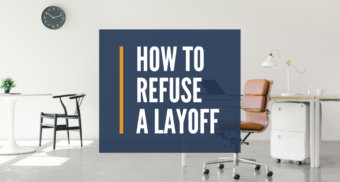Temporary Layoff in B.C. During COVID-19

More than a million Canadians lost their jobs in March 2020. According to a recent Labour Force Survey by Statistics Canada, most of the increase in unemployment was due to temporary layoffs. With no end to the COVID-19 pandemic in sight, the unfortunate reality is that ultimately, many British Columbians may not be recalled to their jobs. This article will focus on the legal rights of non-unionized employees who are put on a temporary layoff in B.C. Unionized employees are advised to consult with their union representative as their rights will depend on the terms of their collective agreement.
In general, non-unionized employees cannot be placed on a temporary layoff, unless:
- Their employment contract (whether expressly or implied) allows for it, or
- The employee agrees to the temporary layoff.
When is a Temporary Layoff in B.C. a constructive dismissal?
If the employment contract does not permit a temporary layoff, and an employee is laid off without his/her consent, then the employee has likely been constructively dismissed. The employee may then immediately claim for severance. Employees should seek legal advice prior to making a claim of constructive dismissal.
What are the limitation periods of a layoff in B.C.?
Many British Columbians have agreed to a temporary layoff in hopes of eventually being recalled (effectively barring a claim of constructive dismissal against their employer). In the meantime, they can expect to receive Employment Insurance benefits or the newly introduced Canada Emergency Response Benefit. However, these employees should be aware that regardless of whether they have agreed to a temporary layoff, the layoff is deemed to be a termination of employment after a certain period of time – 13 weeks.
On May 4, 2020 the B.C. government announced the extension of temporary layoffs from 13 weeks to 16 weeks during the COVID-19 pandemic. This change is temporary, and will only be in place as long as the government deems necessary.
What happens if my temporary layoff lasts longer than 13 weeks in BC?
For the vast majority of employees in B.C., a temporary layoff lasting longer than 13 weeks is legally deemed to be a permanent termination of employment, at which point severance pay must be provided to the employee.
The B.C. Employment Standards Act (ESA) defines a “temporary layoff” as “a layoff of up to 13 weeks in any period of 20 consecutive weeks” (Note that the ESA also allows for an employer, with an employee’s express consent, to apply to the Director of Employment Standards for an extended temporary layoff period).
The ESA further defines a “week of layoff” as “a week in which an employee earns less than 50% of the employee’s weekly wages, at the regular wage, averaged over the previous 8 weeks.” If an employee has engaged in part-time work for their employer during their temporary layoff, the maximum layoff period may become longer than 13 weeks.
If an employee has not earned any pay for 13 consecutive weeks, the employer is deemed to have terminated the employment relationship and as a result, the employee will be entitled to receive a severance package. Remember that during the coronavirus pandemic, employees can now be temporarily laid off for up to 16 weeks (again, this change is said to be temporary during the COVID-19 crisis).
Severance and temporary layoffs
The amount of severance owed depends on a multitude of factors including the employee’s age, length of service, and position. It is a common, but mistaken, belief that an employee’s severance entitlement is limited to one week of pay per year of service. A terminated employee of an advanced age with many years of dedicated service could be owed a severance package of up to 24 months’ pay. Given the declining economy and the current job market in most industries, many employees who have been terminated will likely be entitled to a greater severance package than during normal economic times.
If the maximum temporary layoff period has been exceeded, and an employer fails to provide any severance (or inadequate severance), an employee may commence a legal action for wrongful dismissal against their employer. Consequently, this means most employees in B.C. can claim for severance and commence a wrongful dismissal action against their employer as soon as their temporary layoff period has exceeded 13 weeks.
Employees should consult with a B.C. employment lawyer to determine if/when their temporary layoff becomes a termination of employment and the amount of severance owed.




